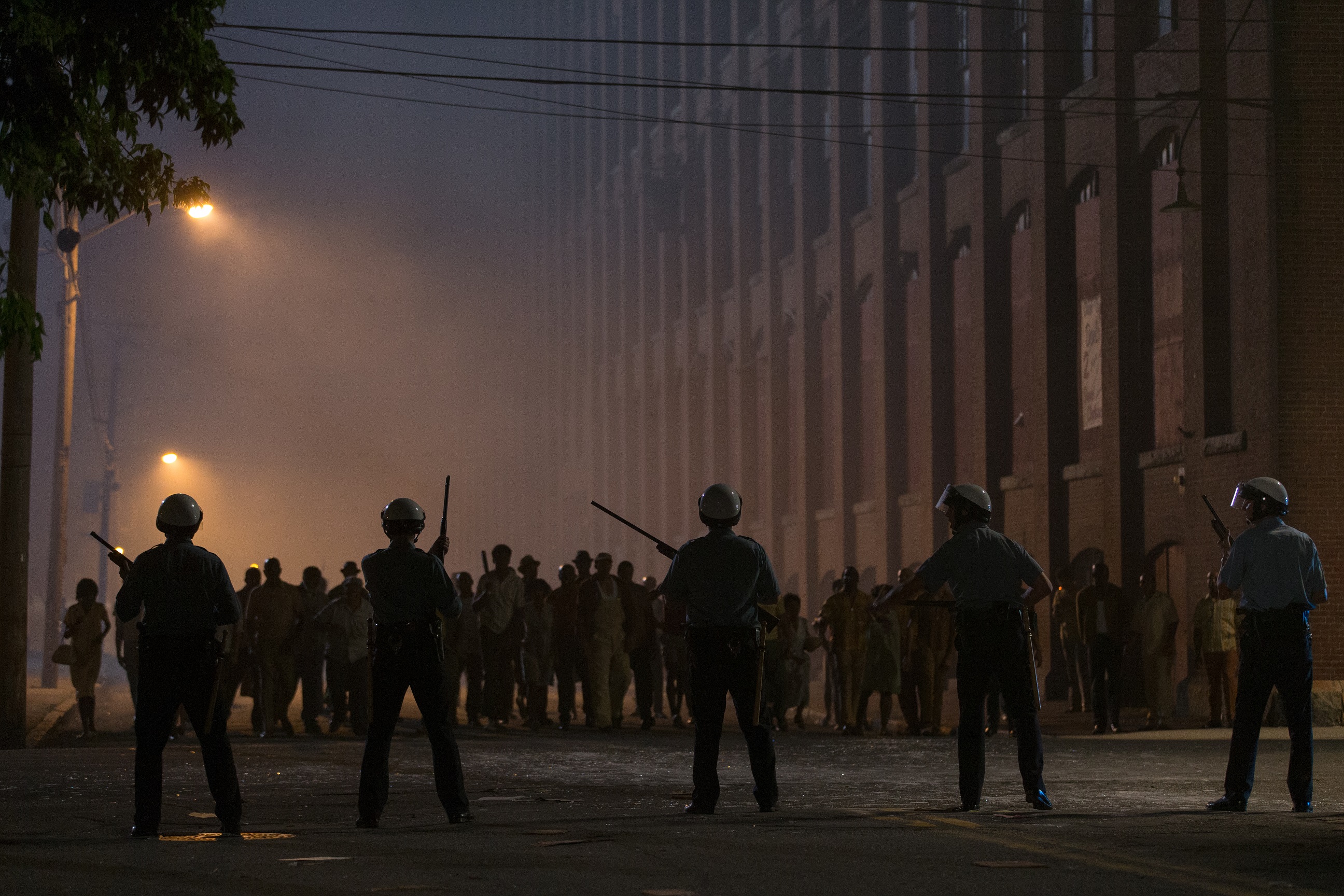
Detroit highlights an ugly moment in the city’s history as the 1967 riots and one deadly night are revisited.
Directed by Kathryn Bigelow from a screenplay by Mark Boal, Detroit stars John Boyega, Will Poulter, Algee Smith, Jason Mitchell, Jacob Lattimore, Hannah Murray, Kaitlyn Dever, with John Krasinski and Anthony Mackie.
The summer of 1967 marked an interesting time in American history. There were anti-war protests against the US involvement in the Vietnam War. The fight for civil rights was still happening as the Fair Housing Act would not be signed into law until April 1968. Life in African-American neighborhoods were only getting worse and their rage only continued to build.
Detroit opens up with panels drawn by African American artist Jacob Lawrence as filmmakers depict the migration from the South.
After getting a look at the early days of the riots, the film grounds itself on the events that transpired one deadly night at the Algiers Motel on July 25, 1967–fifty years ago today. Because the findings through the trial were not conclusive, the events in Detroit were recreated from documents and survivor’s memories–that being said, don’t let it deter you from watching the film. Screenwriter Mark Boal heavily researched this film. He honors the survivors and the victims by sharing their story.
Gunshots fired from the Algiers Motel vicinity led to the Detroit Police Department, the Michigan State Police,
the Michigan Army National Guard and a local private security guard, Melvin Dismukes (Boyega), to search the area for a gun. Unfortunately, the local DPD officers, as a state policeman notes in the movie, were going “nuts.” In the film, the state police chooses to leave the scene as they choose not to get involved in a potential civil rights case.
It’s not just that the police disregarded the rules but it’s what they did to interrogate the guests at the motel. In trying to find the gun that was used, they attacked the guests with force and even played a “death game” in hopes that it would lead somebody to talk. Three men, all unarmed, ended up getting shot point blank that night while others were brutally beaten.
In the criminal trial that follows, the three white officers, including Philip Krauss (Poulter) were not convicted of charges because they weren’t read the Miranda rights. As such, their confessions were inadmissible. Krauss isn’t based on any one real person but rather a testament to the police behavior during that era.
In many ways, the film is grounded through Larry Reed (Smith), the lead singer in The Dramatics. He and his friend, Fred (Latimore), booked themselves for the night at the Algiers so as to get off the streets during curfew. He never was able to get back to singing with the group because of everything that happened that night. Reed and many of the guests have largely been silent about what happened to them. While it’s sad to see what happens on screen, these are stories that we need to hear.
“I think this is an important story to tell,” producer/screenwriter Boal says, “because one of the values of looking
at the past is that it enables you to look at the present from another perspective. And to ask questions such as ‘how much has changed?’ And ‘how much has not changed?'”
“If the purpose of art is to agitate for change, if we are truly ready to start addressing the inequity of race in this country, we need to be willing to listen, ” director Kathryn Bigelow says. “I hope this film will encourage some small part of that dialogue, and we find a way to heal the wounds that have existed for far too long in this country.”
Even as I sat in a room full of film critics late this morning, I couldn’t help but silently drop several F bombs at the activity taking place on screen. How could the officers do this and get away with it? The Algiers Motel shooting may have been all over the news but this was the first time I had heard of it.
Following its world premiere today at the historic Fox Theatre in Detroit on the fiftieth anniversary of the shooting, Annapurna Pictures, in their first outing as a distributor, will open Detroit in select cities on July 28, 2017.




